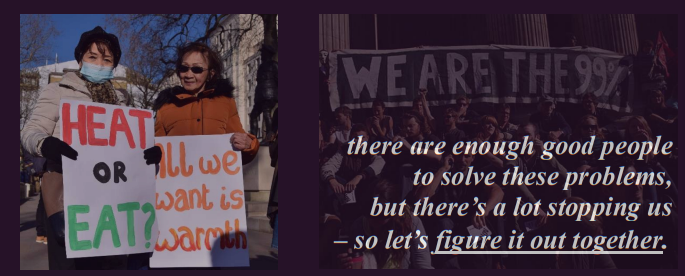The session began with a presentation on many societal issues, including those faced by easily singled-out minorities such as refugees, travellers, queer people, disabled people, and the impoverished classes. Through our discussions, we continually highlighted how these issues feed off each other and how they are effectively impossible to tackle if viewed individually. The group felt strongly that the opportunities we are given to affect change rarely achieve much. We noted that many significant improvements to the lives of the working class only came about through subversive actions taken by the people directly.
Many modern improvements are just window dressing, like “green” technology, most of the recycling industry, even tokenistic employment of individuals of marginalised demographics. Any positive impact these things could have is overwhelmed by the exploitative nature of the dominant system itself. Business as usual is discriminatory, and it is ending life on earth.
But Mutual Aid will always be in the common interest.
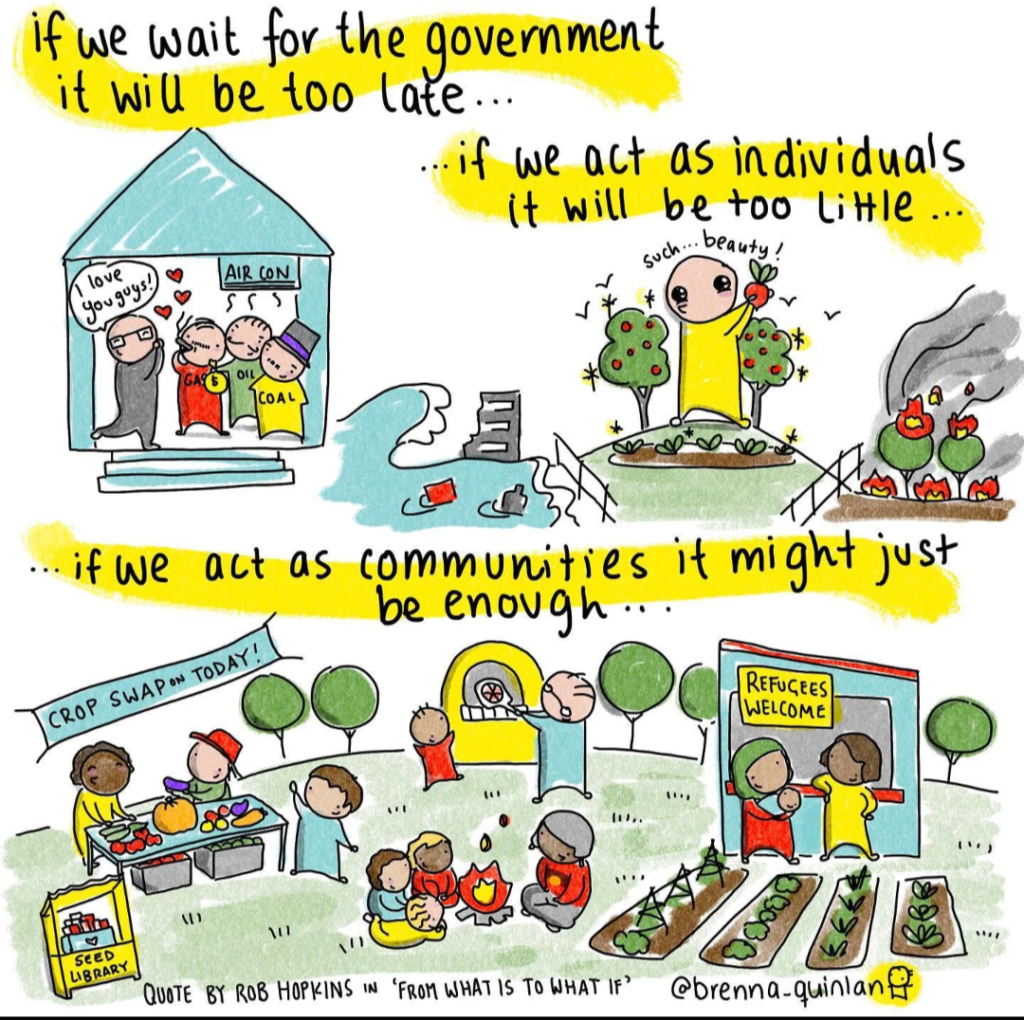
Mutual aid is the idea of voluntary cooperation for the common benefit.
Everybody has something to offer, even if the job market doesn’t have a place for them. Mutual aid is where we work together in the collective interest, without any separate “owner” or investor getting to profit.
We agreed that Mutual Aid is the right thing to do, and it can strengthen society as a whole.

Much of the houseboat community gets by on this sentiment – if someone’s boat needs repairs, often they will teach the owner how to do it themself so they can pass on those skills, strengthening the community as a whole.
Mutual Aid aims to create fairness for everyone, by everyone.
Since this is not achievable in the current system or economy, those who believe in mutual aid seek the abolition of capitalism and all inherently exploitative relationships.

Examples of mutual aid projects and community actions:
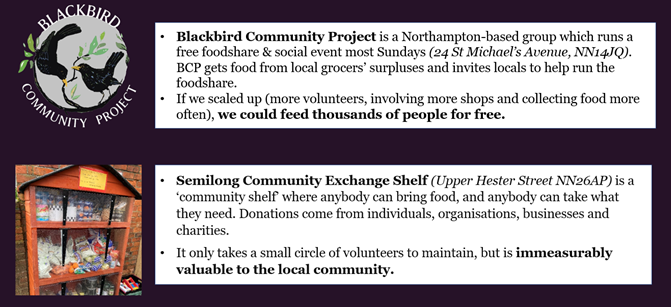
One of our friends shared a powerful account of when many people were queueing at the Semilong Shelf, and a big donation arrived; everybody divided up the packages between the whole group of people, and everyone got something.
We want to highlight similar examples solidarity, so please contact us if you are interested in writing on the Blackcurrent Centre site or in the Blackbird Community Project zine (even if it’s only a few words!).
We asked whether projects like the Blackbird free kitchen or Semilong Shelf are ‘taking bodies out the river, or going upstream to stop them falling in’. We felt that these projects are limited by the fact that they exist in the cracks of the dominant system, relying on its byproducts.
Mutual Aid is not about an exact blueprint that can be recreated everywhere for everything, but if there’s enough general social space for mutual aid; we can create self-supporting community action in a context for total liberation in real-time. We later discussed the idea of expanding the cooperative context to embolden community organisations (see: Discussion notes & the graphic mindmap).

Copwatch and Anti-Raids groups are great spaces for community members to build trust and introduce practical approaches abolishing powerful institutions, such as the Police, that are inherently violent in today’s world.
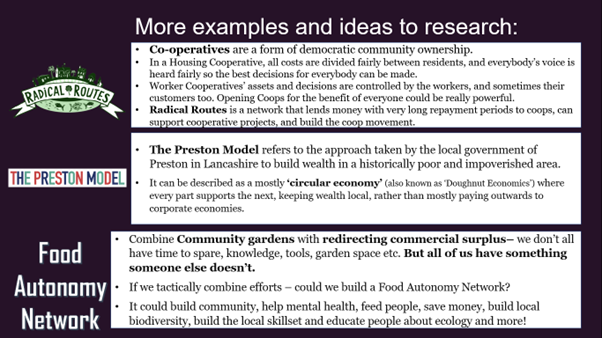
Co-operatives are affordable housing without landlords, and fair work without bosses.
Co-ops can build a lot of power and influence in working-class communities. Could an organisation set up co-ops and pass control of it to people who want to live cooperatively? This could seriously improve everyone’s wealth and ability to affect change – more time and money, more accessibility.
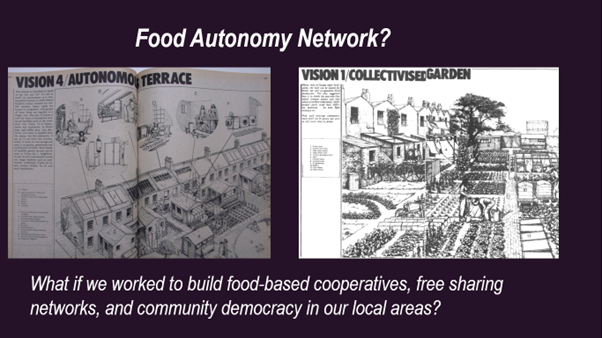
We are confident that regular people are able to make change. It may not be easy, but it’s often more straightforward than it first seems.
If people can get more time through union actions, the campaign for the 4–day work week, lower living costs through cooperative housing, gaining control of their own workplaces through worker cooperatives – we could create something that replaces this destructive and exploitative economy.
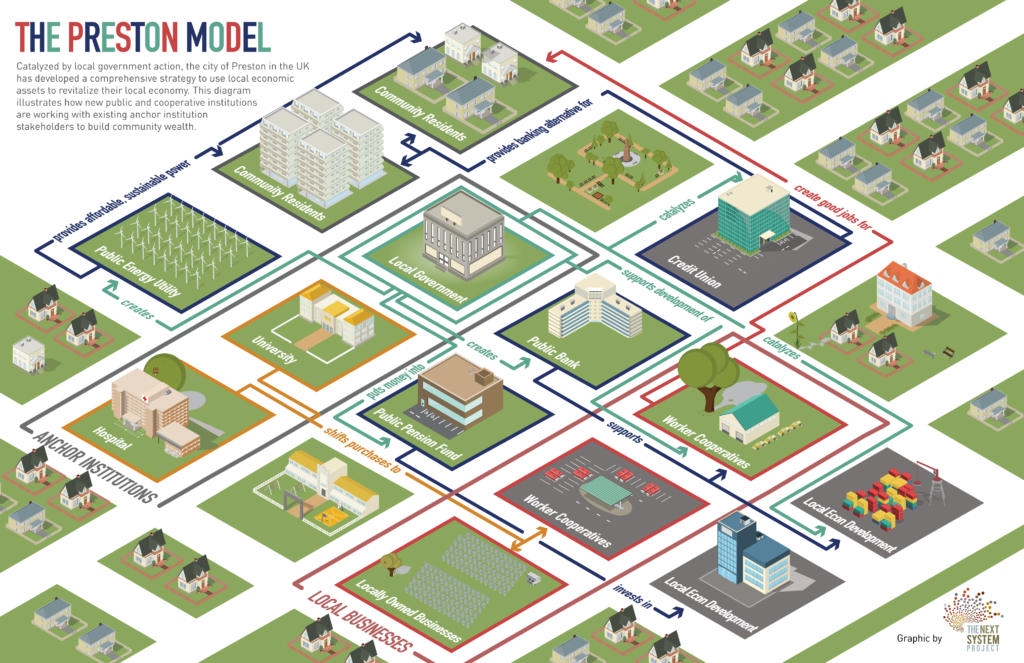
We had a good discussion about the Preston Model and cooperative economies, and will likely host a presentation & discussion on the subject in the future, after we have completed more research.
Discussion notes:
One household can’t grow much of a variety of fruit and veg – but collaborative communities can! especially when the labour isn’t only up to the occupier alone.
Some attendees recently took on a big allotment plot at Studland Road, and others from South Court Environmental are ready for volunteers to join their allotment in Spencer. How to make sure it’s transformative? instead of just a past time. Keep educational, don’t treat volunteers like subjects but enable their joining as ‘members’.
An attendee introduced a platform for ‘time banking’ in Coventry that they call Time Union – people list when they have an hour to spare to support others – this way we can build capacity together.
This is a great starting point, and after discussion we agreed to try and set up a local Timebank. We want the whole social space around these projects to be flexible enough to suit everybody’s needs in the long term, and we think that this is a step along the way.
We discussed how to avoid the Time Bank becoming focused on how much anybody gives or takes; while we didn’t settle a fixed conclusion, we agreed that building an actively supportive community more generally should be the focus. For example if community gardens are regularly supplying & visiting a free-food-share such as BCP’s Sunday food share; an engaged community, an understanding and respect of each other’s boundaries, abilities, and needs will develop. If we build ‘outwards’, continually engaging with existing spaces and having conversations about how to improve collaboration, and helping others take intentional steps – we are learning to respond to our issues as a community without neglecting anybody.
Though many people across the town are interested in growing food, it is a big time commitment that not everyone can commit to, but maybe some could receive the produce and turn it into something else like chutney or jam for the neighbourhood. This mindset can enable many creative collaborations for the community to benefit from.
With our produce, and freely sourced or made materials, we can organise skill-sharing in common spaces like community gardens (Glebeland), community venues (like Heather’s Cafe, The Lab, Abington Community Centre, Blackcurrent etc).
We discussed the Local Exchange Trading System (LETS) which ended in Northampton around the early 2000s. There was a database of time and skills that could be shared, and things that people needed. From there, needs could be met collaboratively, though we felt LETS may have been a bit transactional – we asked how can we make sure the Time Bank doesn’t make the same mistake? How can we develop a reliable GDPR practice that doesn’t rely on centralising responsibility in the hands of a few?
The work that needs doing takes a lot of time overall – so we need to improve collaboration between likeminded venues, existing communities, so they can -together- platform this basis for a time union, and related projects.
These ideas are big commitments, but between us we are already a part of many communities – if we add up all those likeminded folks, there’s already a few hundred people to start from. Not all of us have time, but we agree that there are ways to work towards more time for ourselves, including through union actions and the campaign for a 4-day work week.
We feel there needs to be improved coordination between existing venues and initiatives so they aren’t treading on each other’s toes, and are helping platform each other’s events. Climate Action West Northamptonshire is already doing this with their list of local initiatives and events page.
Another point we discussed was the importance of keeping money and capacity in the local economy, and not just in the hands of the already-propertied class, but regular people; through cooperativising and democratising work and housing. Keep the value of our efforts in the hands of regular people, not bosses or financial speculators. Another benefit is that this enables us to take the ecological actions we know are needed, rather than just hoping the ruling class miraculously grows a conscience for the first time in history.
We think a cooperative, ecologically informed and community-based way of living is where to find the answers, and that making it accessible for many more people will strengthen our actions.
how can we popularise these routes?
These are great starting points, they can be a starting point for something that is inherently popular and in real-time alights people’s consciousness and abilities to affect change.
The group also spent much time discussing Cooperatives, and Cooperative housing.
More Co-operative housing can create a platform from which many sorts of autonomous collaboration can emerge. Having cheap rent & no landlord enables you more time as there is less of a monetary requirement for survival.
Co-ops are not a perfect solution, but they can help us build a plateau which gives us all more time to focus on the work that can bring real change. Between Co-ops, we can build up a social and economic space that can survive more and more without depending on capitalist means.
This will be a project of the group – to extend the cooperative context in Northampton, with many elements e.g. housing, land access, food access, car-sharing, non-hierarchical workplaces etc.
There are examples of multi-property housing coops such as Sanford in South London, Argyle Street in Cambridge. We discussed a coop for house-boats, like a cooperatively-run marina so boaters can stay in place for longer than 2 weeks at a time – not run for profit but collective benefit. We also spoke about a Solar/power Coop, where every building on a street is part of the same solar chain, so everybody reaps the benefit of the sun being angled at different angles throughout the day.
A relevant point is that many HMOs aren’t getting their licences renewed – this is ready-made housing which could be turned into coops with a little money to start. Info on How to Form a Housing Coop.
Radical Routes, Cooperative Bank, Ecology Building Society – starter capital. RR has never lost money in 30 years of lending, and it’s a great network to meet effective cooperators.
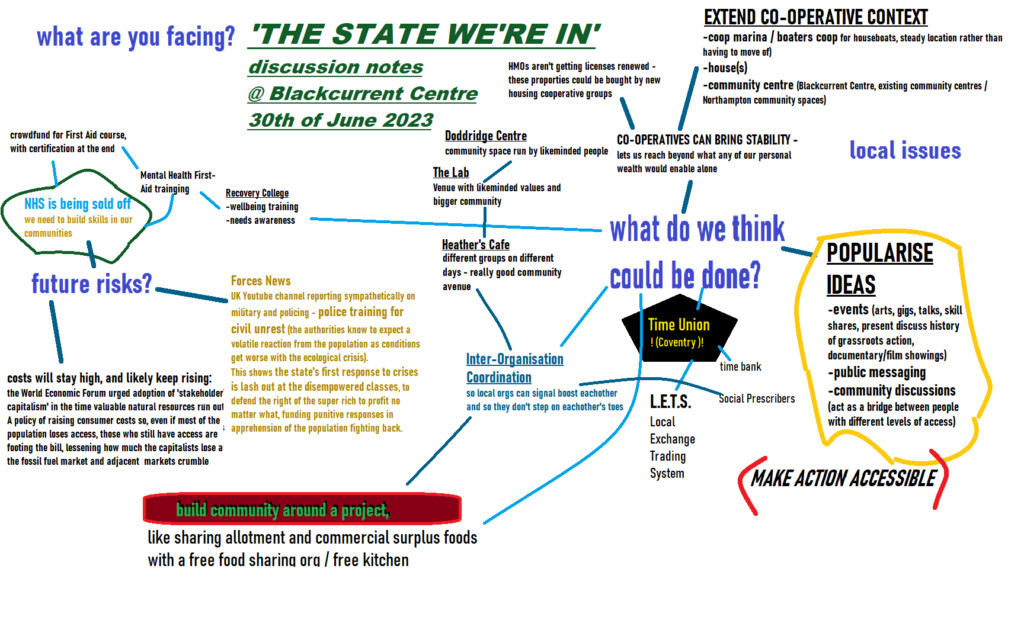
We closed the discussion proposing a learning circle to give concrete structure to our attempts to make meaningful change. Many people besides us have similar conversations and see the unfairness in the world – we want to create space where these discussions can be had in the confidence of a community who is willing to collaborate to affect change. In a subsequent post on this site, we will expand this idea.
We hope you find these notes inspiring, and if you live in Northamptonshire that you will join the learning circle as we create constructive community space. Carry this conversation on with your friends and family!
Thank you!

